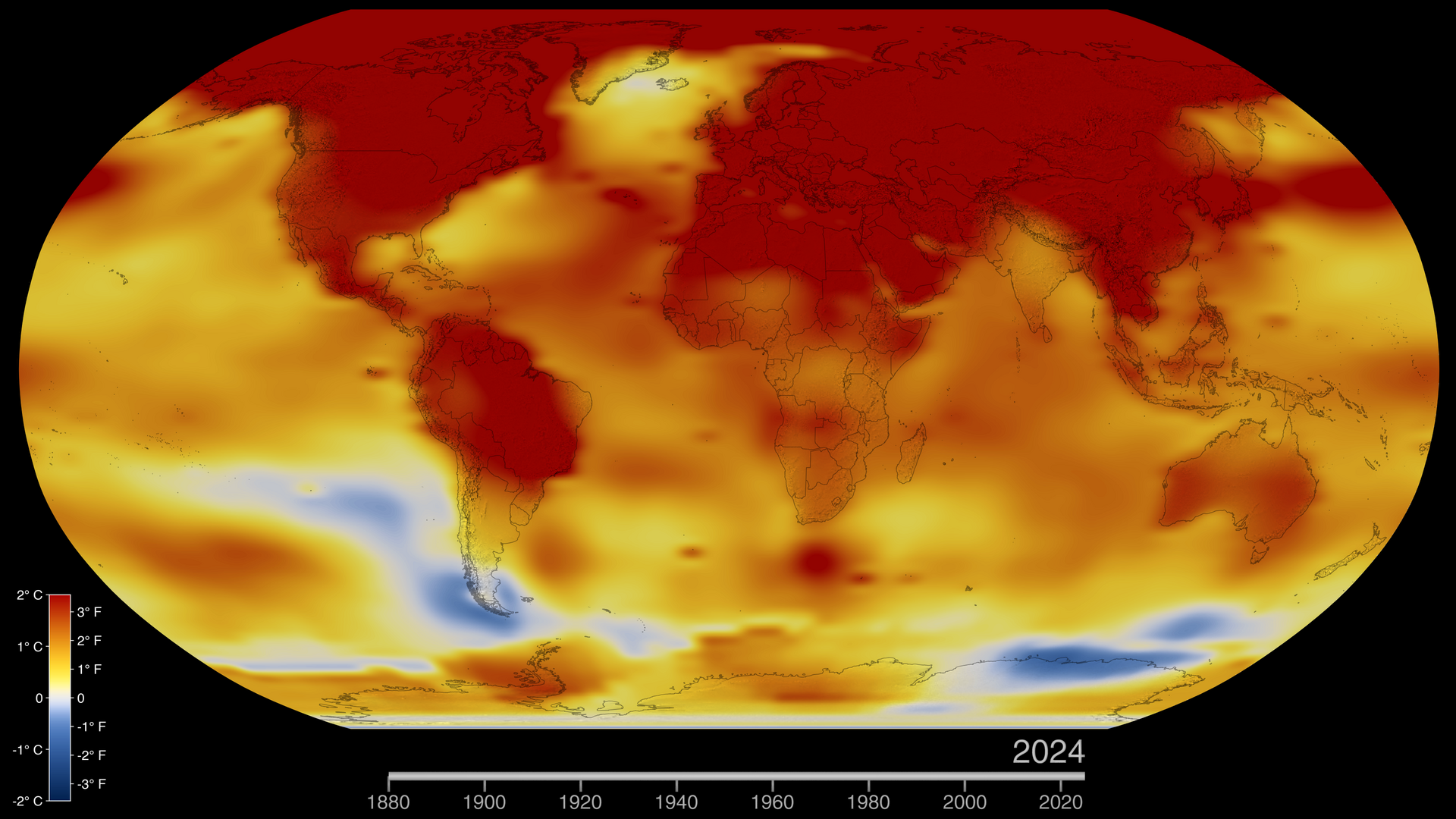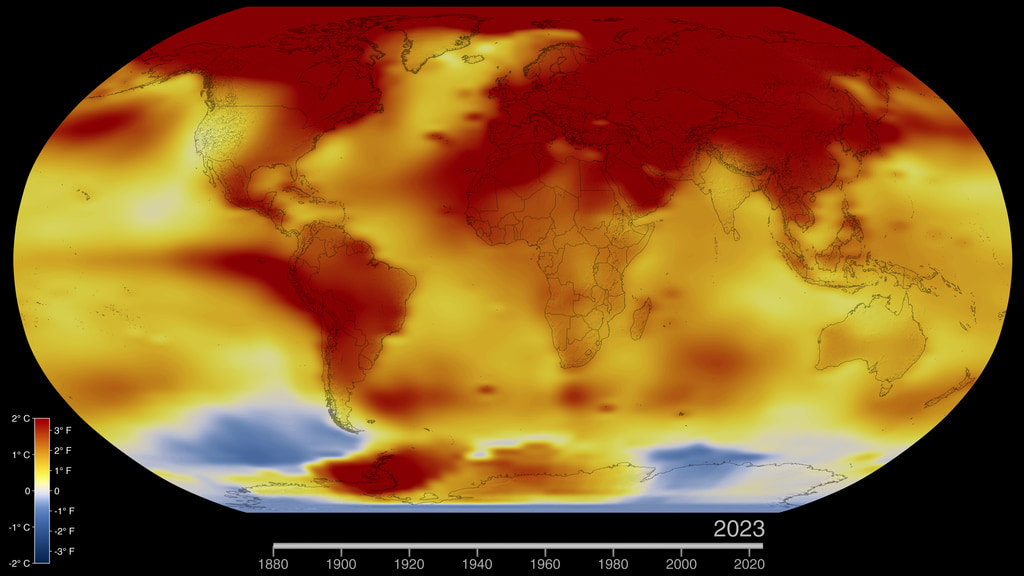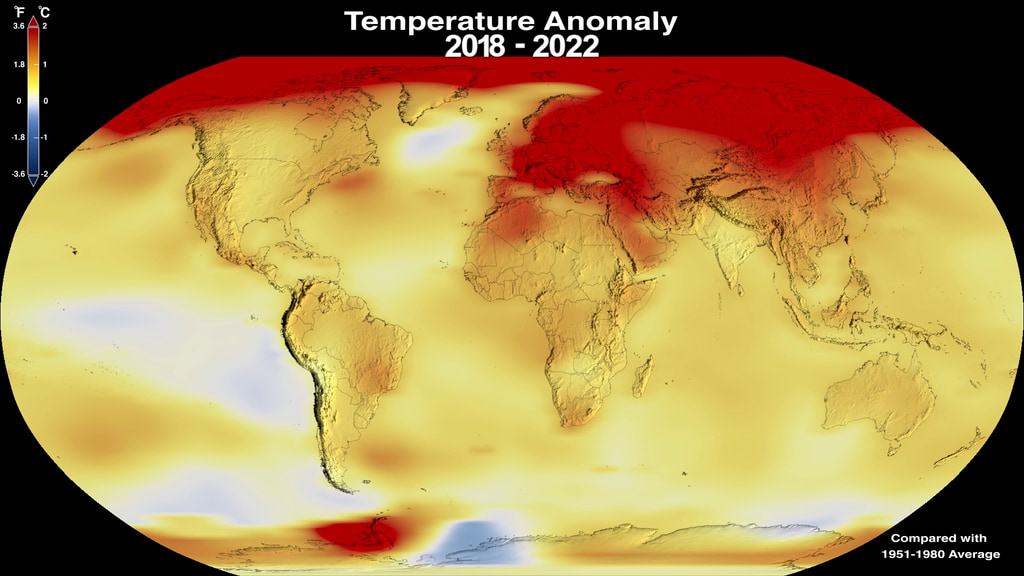The Numbers Are In: Where Does 2021 Rank for Global Temperatures Live Shots

Quick link to latest release: 2021 Tied for 6th Warmest Year in Continued Trend, NASA Analysis Shows
Quick link to announcement soundbite with Dr. Gavin Schmidt
* Quick link to latest graphic showing the 2021 global temperature update. ** Quick link to associated B-ROLL for questions 2-6 on the advisory Quick link to canned interview with Dr. Gavin Schmidt Note that the new graphic showing the 2021 average will be released Thursday, Jan 13 at 11 a.m. EST
Click here for information about the NASA NOAA announcement on Thursday, Jan 13 at 11:00 a.m. EST
From the first ever rainfall on the Greenland icecap to record-shattering heat in the Pacific Northwest, 2021 was a year of extremes. So how does long-term global temperature rise influence these extreme events? And where does 2021 rank in that long-term record?
On January 13th, climate experts from NASA and NOAA will release their annual assessment of global temperatures over the last year. NASA and NOAA scientists are available for one-on-one interviews on Jan. 13 from 12:00 PM - 3:00 PMand Jan. 14 from 6:00 AM - 11:00 AM EASTERN. Find out where 2021 fell in the climate record books, and what it means for the longer term trend.
Each year, NASA and NOAA undertake the huge task of measuring the average temperature of the Earth, using many thousands of measurements all around the globe. Understanding these long-term changes is vital to how we interact with our environment, from planting different crops to managing water resources, to predicting the strength of hurricanes.
Climate researchers from NASA and the National Oceanic and Atmospheric Administration (NOAA) will release their annual assessments of global temperatures and discuss the major climate trends of 2021 during a media teleconference at 11 a.m. EST Thursday, Jan. 13. More information HERE
Anchor Intro:
If you thought summer 2021 was hotter than ever you would be correct - for many of us it was! The continental United States and many locations around the world tied or broke heat records this summer. It was also a year of extremes around the world – from the first ever rainfall on the Greenland icecap, to a historic late-season wildfire outside Denver, and a devastating tornado outbreak in the midwest.
So how did the rest of 2021 fare? NASA and NOAA have released the latest global temperature update for 2021. Here tell us where 2021 fell in the record books is NASA/NOAA expert: xxxx.
Interviews will be conducted using video chat programs including Skype in 15-minute slots. For example 600-615 ET, 615-630 ET, etc. Satellite interviews are not available. Interviews are available in Spanish**
To book an interview please fill out this form: https://forms.gle/JgQhtZfuB9psc3vD7
Suggested Questions:
- NASA and NOAA have just released the global temperature data for 2021. Where does it rank for hottest years on record?
- Last year we saw quite a few disasters and extreme events - droughts, fires, hurricanes, and more. How do changing global temperatures impact those extremes?
- How do the changes you're observing impact people and society?
- NASA recently launched Landsat 9, and is working with NOAA to launch its GOES-T satellite this year. How do NOAA and NASA satellites help us understand our climate and weather?
- What do we expect to see in the future in terms of heat and these global events?
- Where can we learn more?

Banner in Spanish
Canned interview with Dr. Gavin Schmidt / Director, NASA Goddard Institute for Space Studies. TRT 4:39. SOTS separated by slates with the question on it. Full transcript is available under the download button
Associated b-roll for the live shots. TRT - 1:50
Goes with questions 2 - 6 on the advisory:
Last year we saw quite a few disasters and extreme events - droughts, fires, hurricanes, and more. How do changing global temperatures impact those extremes?
How do the changes you're observing impact people and society?
NASA and the USGS recently launched Landsat 9, and in a few weeks NASA and
NOAA will launch the GOES-T satellite this year. How do NOAA and NASA satellites help us understand our climate and weather?
What do we expect to see in the future in terms of heat and these global events?
Where can we learn more?
Soundbite with Dr. Gavin Schmidt/ Director, NASA Goddard Institute for Space Studies aboout the announcement of the global temperature update for 2021. TRT :23. Transcript available under the download button
For More Information
Credits
Please give credit for this item to:
NASA's Goddard Space Flight Center
-
Producers
- Jessica Sansarran (NASA)
- Michelle Handleman (KBR Wyle Services, LLC)
- Christina Brooke Mitchell (KBR Wyle Services, LLC)
- LK Ward (KBR Wyle Services, LLC)
- Kathryn Mersmann (KBR Wyle Services, LLC)
- Katie Jepson (KBR Wyle Services, LLC)
- Maria-Jose Vinas Garcia (Telophase)
- Pedro Cota (ADNET Systems, Inc.)
-
Editors
- LK Ward (KBR Wyle Services, LLC)
- Kathryn Mersmann (KBR Wyle Services, LLC)
Series
This page can be found in the following series:Release date
This page was originally published on Wednesday, January 12, 2022.
This page was last updated on Wednesday, May 3, 2023 at 1:43 PM EDT.




![Universal Production Music: Knock and Wait (Instrumental) by Brice Davoli [SACEM], Well That’s Difference (Instrumental) by Jeff Cardoni [ASCAP], Wanna Be Hipster (Instrumental) by Jeff Cardoni [ASCAP], Curiosity Killed Kitty (Instrumental) by Robert Leslie Bennett [ASCAP], Eco Issues (Instrumental) by Max van Thun [GEMA] Additional Footage: Pond5.com, CSPANComplete transcript available.](/vis/a010000/a014000/a014066/Title.jpg)
